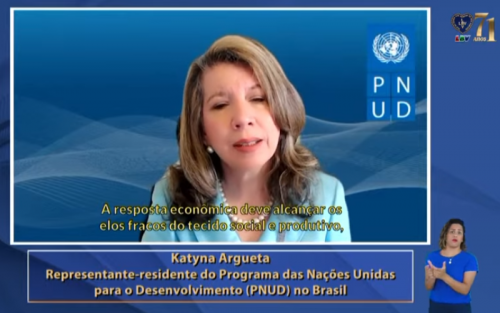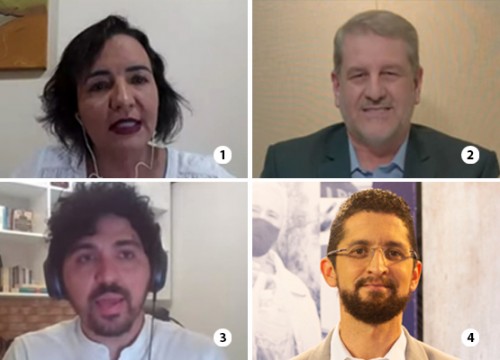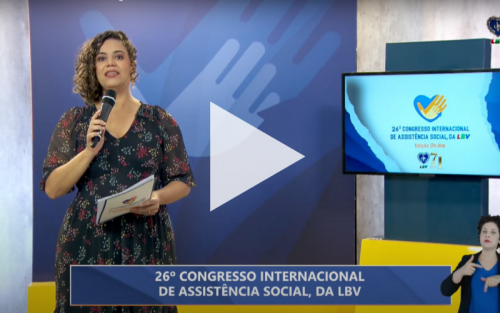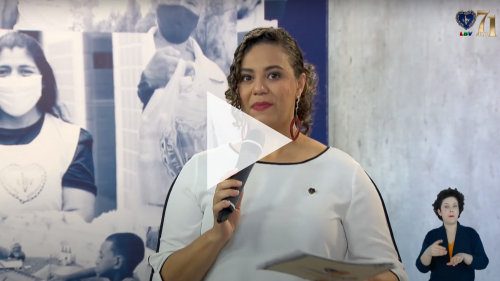Debate on Social Inequality and Poverty at the LGW's Social Event
Highlights of the 26th International Congress on Social Assistance
Last Monday, August 30th, marked the beginning of the LGW's 26th edition of the International Congress on Social Assistance to debate “social inequality and poverty: psychosocial impact of the pandemic” .
Broadcast by the LGW's YouTube channel — with simultaneous translation in English, Spanish and Brazilian Sign Language — the event was aimed at professionals working in the areas of Social Assistance and Human Rights, representatives of civil society and social movements, as well as educators, students and people interested in the subject.
AUGUST 30
The first day of the event opened with the representative of the José de Paiva Netto, president of the Legion of Good Will. Mr. Alziro de Paiva welcomed the participants and introduced the central theme of the meeting.
Afterwards, the participants watched the video "The essence of social assistance at the LGW", which presents the Institution's trajectory from its foundation to the present day, in which it has become a large Social Assistance Entity in Brazil and 6 other countries, aware of social assistance essence and differential.
Lectures cycle: experts share their best practices
To start the cycle of lectures that take place over the two days of the event, Ms. Katyna Argueta, resident representative in Brazil of the United Nations Development Programme (UNDP) and Interim Director of the International Policy Centre for Inclusive Growth (IPC-IG), linked to UNDP, presented her contributions on the theme “Inclusive and resilient recovery from COVID-19 for sustainable livelihoods, well-being and dignity for all: eradicating poverty and hunger in all its forms and dimensions to achieve the 2030 Agenda” which will also be the theme of ECOSOC 60th Session of the Commission for Social Development, in 2022.

Given the current situation, the speaker pointed out that the integration between civil society, the Third Sector and the Government, acting through public policies, is essential in promoting access to food, health and education: "Past experience in previous health crises revealed that it is critical to prioritize investments in social sectors, even in periods of economic recession. Social protection, including income transfer, universal health coverage and access to other basic services, can be a crucial tool not only to help families get along. to maintain in the short term, but also to root out inequalities more broadly. Thus, it is necessary to provide support to buy food, guarantee access to healthcare centers, as well as send children to school, eradicate child labor. "
Next, there was a debate on “The psychosocial impacts of the pandemic and the aggravation of inequalities and poverty in all its dimensions”, with the participation of Messrs. Antonio Paulo Espeleta, social superintendent of the Legião da Boa Vontade; Ricardo Bomfim, responsible for Circular Economy at Enel, in Brazil; and Ionara Rabelo, Violence and Accident Surveillance Manager at the Municipal Health Department of Goiânia/GO and CEPED/Fiocruz Collaborator.

1) Ionara Rabelo, Violence and Accident Surveillance Manager at the Municipal Health Department of Goiânia/GO and CEPED/Fiocruz Collaborator 2) Antonio Paulo Espeleta, Social Superintendent of the LGW 3) Ricardo Bomfim, Ricardo Bomfim, responsible for Circular Economy at Enel Brazil 4) Daniel Guimarães, Sociologist and debate moderator
To end the first day of the event, Mr. Alan Bojanic, representative of the United Nations (FAO) of Colombia, PhD in Environmental Economics from the University of Utrecht – Netherlands, presented an important lecture on “Food and nutrition security and the impacts of the pandemic”. The theme has everything to do with the situation faced by thousands of families that were severely hit by the new coronavirus pandemic, which aggravated the scenario of socioeconomic instability and people vulnerability, due to unemployment, loss of income, food inequalities and even shortages.
AUGUST 31
On the second day of the event, the lecture cycle was resumed by Mr. Wilson Bigas, Manager of the LGW’s Social Assistance Department and a Business Administrator. He spoke about the "impacts of the Pandemic on Individuals and Families Assisted by the LGW".
Bigas, who is also a specialist in Social Policy Management, recalled that, in this pandemic, some social assistance challenges were accentuated. "It brought to the surface not only a health crisis, but pre-existing structural problems in our society. It was possible to observe implications that go beyond medical and pandemic issues."
Regarding assistance to families at this time, he reiterated the importance of a protection network, in view of the high levels of inequalities and how the LGW continues working to alleviate the consequences of the global health crisis. "We propose to discuss the psychosocial impacts of the pandemic on individuals and families assisted by the LGW, through a survey. Social implications, such as: unemployment, decreased income, precariousness of working conditions, isolation and interpersonal distancing, which weaken bonds, grow rights violations, among other issues, have increased emotional pressure and material risks experienced by Social Assistance beneficiaries and workers.
Next was a lecture on "the role of basic social protection in the pandemic period", by Ms. Aldenora Gomes González, Social Worker, President of Instituto EcoVida, founder and Executive Secretary of the National Forum of Users of the Unified Social Assistance System – FNUSUAS and Vice-President of the National Council for Social Assistance.
For her, "social assistance carries the responsibility of articulating immediate actions, among public policies, so that families can access their rights, promoting comprehensive care for families in the territories and the protection of the most vulnerable groups, such as children and the elderly. And the experience from COVID-19 has demanded a great commitment of integrated initiatives to assist the population, in order to provide basic services necessary for survival of citizens in a situation of social vulnerability".
In her lecture on "Facing up to COVID-19 and humanized actions in institutional shelters for the elderly", Ms. Marília Berzins, Ph.D. in Public Health, a specialist with a graduate and master’s degree in Gerontology and President of OLHE, Observatory of Human Longevity and Aging, highlighted "that aging with dignity is a human right, dignity is owed to us as beings, simply because we are people, because we are humans. And I want to remind you that old age is the present and future of Brazil, elderly accounting for 18.6% of the Brazilian population, each time this number will be more significant. Today, 40 million people have reached 60 years or more. This is very good, this is cause for celebration! But the fact that there are more and more elderly people doesn't mean that all these people live their old age with dignity. That's why we bring up this challenge, because aging with dignity is a fundamental human right. And in Brazil, people who work with aging groups must take responsibility, the commitment of all of us, civil society, family, state, for dignified aging, this is our great challenge".
Closing the second day of the event, the speakers debated the theme “social inequality and poverty: psychosocial impacts of the pandemic”.


